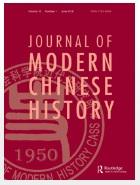Cooperation Networks and Actors in Semi-Colonial China, 1860-1911
Mechthild Leutner – 2008
This paper focuses on “cooperation networks” for the provision of public goods and services as a specific form of governance in late imperial China. While concentrating on differing forms of local self‐regulation at the end of the Qing dynasty, the article pinpoints several actors involved in the cooperation networks and (re)classifies them along the continuum of “public” and “private.” In addition to state and non‐state actors, the players included semi‐state or hybrid actors with profound network advantages who played a crucial role in the provision of governance services, as well as colonial and transnational actors who occasionally took part in this cooperation. To contextualize these actors and illustrate their modes of interaction, this paper will describe cooperation networks established for the provision of disaster relief and education in local society in late Qing China. In so doing, this paper also will question participants' motives and describe their personal gains, as well as the accumulation of symbolic capital as major incentives.

